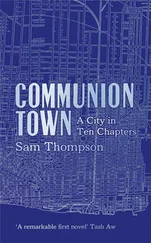Frank Tallis - Deadly Communion
Здесь есть возможность читать онлайн «Frank Tallis - Deadly Communion» весь текст электронной книги совершенно бесплатно (целиком полную версию без сокращений). В некоторых случаях можно слушать аудио, скачать через торрент в формате fb2 и присутствует краткое содержание. Жанр: Исторический детектив, на английском языке. Описание произведения, (предисловие) а так же отзывы посетителей доступны на портале библиотеки ЛибКат.
- Название:Deadly Communion
- Автор:
- Жанр:
- Год:неизвестен
- ISBN:нет данных
- Рейтинг книги:3 / 5. Голосов: 1
-
Избранное:Добавить в избранное
- Отзывы:
-
Ваша оценка:
- 60
- 1
- 2
- 3
- 4
- 5
Deadly Communion: краткое содержание, описание и аннотация
Предлагаем к чтению аннотацию, описание, краткое содержание или предисловие (зависит от того, что написал сам автор книги «Deadly Communion»). Если вы не нашли необходимую информацию о книге — напишите в комментариях, мы постараемся отыскать её.
Deadly Communion — читать онлайн бесплатно полную книгу (весь текст) целиком
Ниже представлен текст книги, разбитый по страницам. Система сохранения места последней прочитанной страницы, позволяет с удобством читать онлайн бесплатно книгу «Deadly Communion», без необходимости каждый раз заново искать на чём Вы остановились. Поставьте закладку, и сможете в любой момент перейти на страницу, на которой закончили чтение.
Интервал:
Закладка:
‘Did you touch the body?’
‘You must be joking. It’s bad luck to touch the dead.’ The gardener shivered and lowered the bucket to the floor. ‘I went straight to the stables. I woke up one of the lads and sent him off to Hainburgerstrasse — told him to go as quick as his legs would carry him.’ Wilfing’s expression became anxious. He took a watch from his pocket and, glancing at its face, added: ‘Can I get back to work now? If the beds get ruined and the prince’s guests are displeased there’ll be hell to pay!’
‘Herr Wilfing, I suspect the prince’s guests will be even more displeased if the body hasn’t been removed by eleven o’ clock. I am afraid I must ask you to wait here until my assistant arrives. You must make a statement. When this is done you can proceed with your duties.’
Rheinhardt left the gatehouse and walked up the path, heading towards the torches. He could see very little, but as he made his ascent his eyes adjusted to the darkness and he became aware of the Upper Palace as an elevated penumbra situated at the other end of the gardens. The distinctive line of the roof — suggesting a desert kingdom of tents and pavilions — was made just visible by the dull glow of the sleeping city beyond. Aiming for the feverish incandescence of the torches, Rheinhardt entered a mazelike arrangement of hedges. They enclosed a sunken lawn, in the middle of which was the conspicuous form of a supine female body. Next to her stood an anxious-looking constable, his hand gripping the hilt of his sabre, his tense posture communicating his readiness to use it.
‘It’s all right, Kiesl. Inspector Rheinhardt — security office.’
The constable let go of his weapon.
‘Sir.’
Rheinhardt approached the body.
‘Anything to report?’
‘No, sir.’
‘Where did you get these torches from?’
‘Herr Wilfing — the head gardener. You’ve spoken to him?’
‘Yes.’
‘His paraffin lamp didn’t give off enough light. I thought you’d be needing something better.’
‘Well done, Kiesl. Commendable foresight.’
‘Thank you, sir.’
Rheinhardt gazed at the dead woman. The scene evoked memories of the opera house: a shield maiden laid out beneath a starry sky, torch-bearers and a pyre. Crouching down beside her and falling on one knee like a vassal, he studied her face. Young. Early twenties, perhaps? A beauty spot beneath her left eye; coils of blonde hair complementing strong features; her chin, a little too broad — a dimple near its apex; long white lashes. The redness of her cheeks was borrowed from the flames.
Bracing himself, Rheinhardt slipped his hand beneath her occipital bone. He felt something cold and hard projecting out above the uppermost vertebra. When he tried to move it he found that it was fixed. He did not trouble to raise the body any higher in order to examine the object. He knew exactly what it was. The decorative head of a hatpin. To be exact: the decorative head of the hatpin purchased at Frau Schuschnig’s shop by the man calling himself Griesser.
Rheinhardt positioned himself at the other extremity of the woman’s body and lifted the hem of her skirt. There was no mistaking the pungent odour and — as he had expected — she wasn’t wearing any drawers. He knew before he looked over his shoulder that the young constable’s expression would be disapproving.
‘Kiesl. I would be most grateful if you would search the area for a ladies’ hat — and a ladies undergarment.’
‘Yes, sir.’
The constable pulled one of the torches from the ground and disappeared behind a hedge.
Rheinhardt searched the dead woman’s pockets. He found some money, a set of keys, a box of slim cigars, and a silk monogrammed handkerchief showing the interlinked letters C and R. He experimented with some possible names: Clara Raich, Charlotte Ruzicker, Christel Rebane … He thought of the other victims: Zeiler, Babel and Wirth. How many more women would this monster take? Rheinhardt was overcome by a wave of pity and hopelessness. The investigation had not progressed at all and it was his fault. It was his case, his responsibility — and what had he achieved? The collection of a few worthless facts, useless scraps of information. Commissioner Brugel had been right to admonish him. Guilt found a niche in Rheinhardt’s gut. It settled somewhere in his lower abdomen, among the peristaltic mass of his intestines. Nausea threatened to empty his stomach. He stood up and made his way back to the path.
The broad staircase rising to the upper level of the gardens was inviting. Somehow the notion of ascent seemed to promise Rheinhardt the prospect of release from the despair that had suddenly seized him.
Higher ground, clarity, a longer view …
Rheinhardt climbed to the top, where he was confronted by one of the Belvedere’s famous sphinxes. There was just enough light to make out her crouching, winged presence. The inspector approached and halted directly in front of her. The expression that she wore was one of supreme indifference, a blend of ennui and scornful disregard. She was wearing a cuirass, the design of which emphasised the fullness of her perfectly rounded breasts. Rheinhardt sensed her sisters, out there in the darkness — infinitely patient — a pride of sphinxes, incubating secrets.
‘Give me the answer,’ he whispered.
So, it’s come to this, Rheinhardt thought. Begging a statue for help!
If the sphinx did possess supernatural powers, she showed no sign of willingness to employ them at Rheinhardt’s bidding. Her centuries of disinterest and stony constitution had inured her to human misery: what could be more inconsequential than four human lives to a beast whose seasons were epochs?
‘Sir?’ Kiesl’s voice floated up from below.
‘What is it?’
‘I’ve found something … an undergarment.’
‘All right. I’m coming down.’
Rheinhardt descended the steps and negotiated the little maze of hedges. He found the constable — a torch held aloft in one hand, a pair of yellow drawers in the other — looking like a strange parody of the goddess Libertas.
‘Where did you find them?’
‘Just here — thrown over this bush.’
Rheinhardt took the item from the constable.
‘Now see if you can find her hat.’
Rheinhardt went back to the body. He patrolled the lawn, systematically searching the ground for anything that might have been dropped. While he was doing this he heard footsteps — the brisk, energetic stride of his assistant.
‘Ah, there you are, Haussmann.’
‘I came as fast as I could.’
‘Indeed.’
Rheinhardt gestured toward the dead woman.
‘Her initials are CR.’
‘Cacilie Roster,’ said Haussmann.
‘What?’
‘That’s her name. Cacilie Roster. I recognise her. She’s an entertainer. She does variety shows. I’ve seen her singing comic songs at Ronacher’s.’
36
In due course I worked for several undertakers; however, it wasn’t until I secured a position at the Erste Wiener Leichenbestattungs-Anstalt Enterprise des Pompes Funebres that I was permitted to assist Doctor Traugott Stohl — the embalmer. I had always been interested in embalming and considered myself fortunate to have this opportunity to study the procedures involved. Of course, I had seen embalmers at work before but, as you will appreciate, embalming is not common and observations conducted at a distance are no substitute for participation. I have no idea why embalming isn’t more popular in Vienna, a city which has always appreciated the beauty of a corpse in eternal repose. The aristocracy are fond of laying out their dead — as are certain members of the bourgeoisie, such as composers and politicians. But other than among these elements of society, embalming is largely restricted to instances in which the deceased must be transported over a long distance to a final resting place. Indeed, in such cases where the transfer will take a week or longer, embalming is compulsory, as decreed by the Minister of the Interior on the third of May 1875. You see? My enthusiasm knows no bounds. Even the legislation surrounding death has a peculiar fascination for me. But again, I digress.
Читать дальшеИнтервал:
Закладка:
Похожие книги на «Deadly Communion»
Представляем Вашему вниманию похожие книги на «Deadly Communion» списком для выбора. Мы отобрали схожую по названию и смыслу литературу в надежде предоставить читателям больше вариантов отыскать новые, интересные, ещё непрочитанные произведения.
Обсуждение, отзывы о книге «Deadly Communion» и просто собственные мнения читателей. Оставьте ваши комментарии, напишите, что Вы думаете о произведении, его смысле или главных героях. Укажите что конкретно понравилось, а что нет, и почему Вы так считаете.












